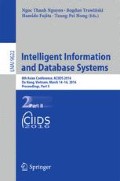Abstract
The paper introduces the model of hybrid flexible model of teaching/learning English for students of Informatics-related study programmes. Based on the theoretical feedback the model includes the traditional face-to-face lessons, work in the online course and autonomous activities available through mobile devices. For the purpose of efficient use of the model, a survey on mobile devices availability and their use was conducted in the group of 312 students of the Faculty of Informatics and Management, University of Hradec Kralove. After the three-month exploitation of the model students’ feedback was collected. Finally, several recommendations for designing the mobile-assisted (language) learning are provided.
Access this chapter
Tax calculation will be finalised at checkout
Purchases are for personal use only
References
European Commission. Growth, competitiveness, and employment. The challenges and ways forward into the 21st century. Brussels: European Commission (1993)
European Commission. White Paper on Education and Training - Teaching and Learning - Towards the Learning Society. Brussel: European Commission (1995)
European Commission. Towards a Europe of knowledge (1997). http://europa.eu/legislation_summaries/other/c11040_en.htm
European Commission. The eLearning Action Plan: Designing tomorrow’s education. Brussel: European Commission (2001)
ETUC. The European Union’s Lisbon Strategy. ETUC European Trade Union Confederation (2006). http://www.etuc.org/a/652
ET2020. Education and Training 2020. Europa (2009). http://europa.eu/legislation_summaries/education_training_youth/general_framework/ef0016_en.htm
EU2020. About the Europe 2020 Strategy. EU2020 (2010). http://ec.europa.eu/europe2020/index_en.htm
Graddol, D.: English next. http://www.britishcouncil.org/learningenglish-next.pdf
Traxler, J.: Current state of mobile learning. In: Ally, M. (ed.) Mobile Learning. Transforming the Delivery of Education and Training, pp. 9–24. AU Press, Athabasca (2009)
Simonova, I., Poulova, P.: Learning Style Reflection Within Tertiary e-education. WAMAK, Hradec Kralove (2012)
Allen, E., et al.: (2007). https://www.uwb.edu/learningtech/elearning/hybrid-and-online-learning/hybrid-learning/about-hybrid-learning/definition-hybrid-learning
Simonova, I.: Mobile-assisted ESP learning in technical education (to be published)
Roschelle, J.: Unlocking the learning value of wireless mobile devices. J. Comput. Assist. Learn. 19, 260–272 (2003)
Liang, L., Liu, T., Wang, H., Chang, B., Deng, Y., Yang, J., Chou, C., Ko, H., Yang, S., Chan, T.: A few design perspectives on one-on-one digital classroom environment. J. Comput. Assist. Learn. 21(3), 181–189 (2005)
Ally, M. (ed.): Mobile Learning. Transforming the Delivery of Education and Training. AU Press, Athabasca University (2009)
Crompton, H.: A historical overview of mobile learning: toward learner-centered education. In: Berge, Z.L., Muilenburg, L.Y. (eds.) Handbook of Mobile Learning. Routledge, Florence (2013)
Sharples, M., Sánchez, I.A., Milrad, M., Vavoula, G.: Mobile learning: Small devices, Big issues. http://www.uio.no/studier/emner/matnat/ifi/INF5790/v12/undervisningsmateriale/articles/KAL_Legacy_Mobile_Learning_(001143v1).pdf
Kearney, M., Schuck, S., Burden, K., Aubusson, P.: Viewing mobile learning from a pedagogical perspective. Res. Learn. Technol. 20, 1–17 (2012)
Chen, X.B.: Tablets for informal language learning: student usage and attitudes. Lang. Learn. Technol. 17(1), 20–37 (2013)
Hsu, L.W.: English as a foreign language learners’ perception of mobile assisted language learning: a cross-national study. Comput. Assist. Lang. Learn. 26(3), 197–213 (2013)
Viberg, O., Gronlund, A.: Cross-cultural analysis of users’ attitudes towards the use of mobile devices in second and foreign language learning in higher education: a case study from Sweden and China. Comput. Educ. 69, 169–180 (2013)
de la Fuente, M.J.: Learners’ attention to input during focus on form listening tasks: the role of mobile technology in the second language classroom. Comput. Assist. Lang. Learn. 27(3), 261–276 (2014)
Golonka, E.M., Bowles, A.R., Frank, V.M., Richardson, D.L., Freynik, S.: Technologies for foreign language learning. Comput. Assist. Lang. Learn. 27(1), 70–105 (2014)
Lorenz, M.: Kde nechala škola díru: m-learning aneb Vzdělání pro záškoláky [Where school let a hole yawn: m-learning or education for truants] (2011). http://pro.inflow.cz/kde-nechala-skola-diru-m-learning-aneb-vzdelani-pro-zaskolaky
Corbeil, J.R., Valdes-Corbeil, M.E.: Are you ready for mobile learning? Educause Q. 30(2), 51–58 (2007)
Wasiluk, G.: Best Practices for Designing Mobile Learning. https://community.articulate.com/articles/design-mobile-learning-like-a-pro-best-practices-for-mlearning
Palalas, A.: Mobile-assisted language learning: designing for your students. In: Thouësny, S., Bradley, L. (eds.) Second Language Teaching and Learning with Technology: Views of Emergent Researchers, pp. 71–94. Research-publishing.net, Dublin (2011)
Koole, M.L.: A model for framing mobile learning. In: Ally, M. (ed.) Mobile Learning. Transforming the Delivery of Education and Training, pp. 25–48. AU Press, Athabasca (2009)
Vygotsky, L.: Mind in Society: The Development of Higher Psychological Processes. Harvard University Press, Cambridge (1978)
Smith, P., Ragan, T.: Instructional Design. Wiley, Toronto (1999)
Mobile learning handbook. sites.google.com/a/adlnet.gov/mobile-learning-guide/best-practices#TOC-Planning-for-Design
Acknowledgment
The paper is supported by the IGA project Didactic aspects of Blackboard Mobile Learn implementation into instruction at FIM.
Author information
Authors and Affiliations
Corresponding author
Editor information
Editors and Affiliations
Rights and permissions
Copyright information
© 2016 Springer-Verlag Berlin Heidelberg
About this paper
Cite this paper
Simonova, I., Poulova, P. (2016). Mobile-Assisted Model of Teaching and Learning English for IT Students. In: Nguyen, N.T., Trawiński, B., Fujita, H., Hong, TP. (eds) Intelligent Information and Database Systems. ACIIDS 2016. Lecture Notes in Computer Science(), vol 9622. Springer, Berlin, Heidelberg. https://doi.org/10.1007/978-3-662-49390-8_33
Download citation
DOI: https://doi.org/10.1007/978-3-662-49390-8_33
Publisher Name: Springer, Berlin, Heidelberg
Print ISBN: 978-3-662-49389-2
Online ISBN: 978-3-662-49390-8
eBook Packages: Computer ScienceComputer Science (R0)

